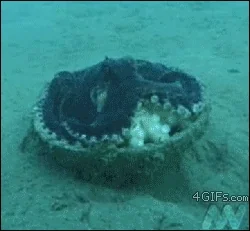URI
engineering professor receives grant to develop first underwater EEG electrodes
to monitor octopuses
Olivia
Ross
 Walter Besio, a professor in the
University of Rhode Island College of Engineering, recently received a $100,000
grant from the National Science Foundation to develop the first underwater
electroencephalography (EEG) electrodes and to build them into transparent
octopus housing.
Walter Besio, a professor in the
University of Rhode Island College of Engineering, recently received a $100,000
grant from the National Science Foundation to develop the first underwater
electroencephalography (EEG) electrodes and to build them into transparent
octopus housing.
The grant is part of a $16 million
initiative from the NSF that funds 18 cross-disciplinary projects for research
into neural and cognitive systems. The effort seeks to accelerate the
development of new neurotechnologies.
“The octopus offers an alternative
solution to complex brain design. Just as their eyes have come to resemble ours
through convergent evolution, we hope to discover shared cognitive, anatomical
and computational principles by investigating their ‘alien’ nervous system,”
the researchers said in a prepared statement.
Besio’s work is part of an overall
$300,000 proof-of-concept collaborative effort among researchers, each of whom
brings unique expertise to the project. Besio is in charge of the engineering
of the EEG electrodes; Peter Tse of Dartmouth College is in charge of imaging,
octopus care and psychophysics; and Gideon Caplovitz of the University of
Nevada Reno, is in charge of the advanced EEG data analysis.
“Octopus are complex and have half a
billion neurons, which is comparable to the number in a dog,” said Besio, a
professor of electrical, computer, and biomedical engineering.
“The octopus is very different, so trying to understand how they developed and evolved to have such high computing power could help us to understand how to make better computers or advance artificial intelligence.”
“The octopus is very different, so trying to understand how they developed and evolved to have such high computing power could help us to understand how to make better computers or advance artificial intelligence.”
One of the experiments will involve
having a virtual crab walk into the octopuses’ line of vision to see if the
octopus will watch the crab. Once the crab goes behind a rock, researchers will
examine if the octopus is still looking for the crab.
This will help give better insight into the cognition and awareness of octopuses and how they understand.
This will help give better insight into the cognition and awareness of octopuses and how they understand.
For his portion of the research,
Besio is tasked with developing corrosion-resistant underwater EEG electrodes
to build into a shelter for the octopus. Inside a big saltwater tank, the
octopus will have a small, clear cylinder shelter where they feel safer than in
the open water.
The risk comes from trying to record brain signals from the octopuses in their natural environment without putting the electrodes on them. Besio admits that trying to get the electrodes to work in salt water without touching them or putting them on the animal will be challenging, but it is a task he looks forward to conquering.
The risk comes from trying to record brain signals from the octopuses in their natural environment without putting the electrodes on them. Besio admits that trying to get the electrodes to work in salt water without touching them or putting them on the animal will be challenging, but it is a task he looks forward to conquering.
Olivia Ross, an intern in the
Marketing and Communications Department at URI and public relations major,
wrote this press release.